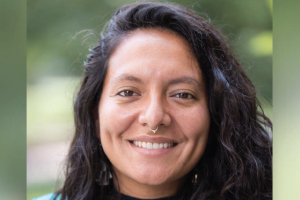Grad student retraces family’s immigration history in new documentary

Brandon Bieltz, University Communications
The journey Alex M. Sanchez’s family has taken to get to the United States has been anything but a direct path.
Her grandmother was first forced to leave Europe for Central America during World War II, fleeing persecution for being Jewish. The Nicaraguan Revolution forced the other side of her family to later immigrate farther north to Mexico, and they ultimately crossed into the United States for better opportunities.
The family’s story is not unlike those shared by many immigrants and refugees around the world. It’s a story of resilience, but it’s also one full of complexities and nuances that are often bypassed when discussing immigration.
As a journalist and a graduate student at the UNC Hussman School of Journalism and Media, Sanchez is using her developing video skills to share her family’s story in a documentary that she hopes will further the discussion of how the stories of immigrants and refugees are told.
“Our country is made up of immigrants, and we’re all from different places,” said Sanchez, a Park Fellow at the Hussman School. “The more that these types of stories are told, the more that it is normalized. The more stories that are told, the more understanding.”
The project is one of three that received the Student Arts Innovation Grant, an annual Arts Everywhere award of $1,000 for select undergraduate and graduate students or $3,000 for a group. Other recipients of this year’s award are a group of students from the global studies department who are launching a digital publication and Daniel Dilliplane, who is creating an interactive and multisensory experience called “Sensing Bodies in Common.”
Students submit for the grant by pitching proposals for arts-related projects, which they agree to complete within a year of being chosen. The resulting works are meant to infuse Carolina’s campus with creativity.
For Sanchez, that award means being able to obtain better equipment, fund travel to complete her interviews and host a screening once the documentary is complete. The project is something Sanchez has contemplated doing for a long time, and with the combination of the Students Arts Innovation Grant and mentorship through her courses at the Hussman School, she’s now able to bring it to life.
Sanchez’s documentary follows the experiences of her mother and aunt and their path to the United States. With a combination of stop-motion animation, archive footage and interviews, she aims to tell the story of immigration from the perspectives of those who have experienced it.
“It’s like picking at a scab that’s calloused over for some time,” she said. “It’s really an evaluation of what their intentions were when leaving their county and their home, and asking them really hard questions about what it means to be an immigrant and asking them if they feel like they’ve gathered all the things they wanted to gain from this country. It’s a pretty big question to be asking people.”
Sanchez plans to finish the documentary over the summer once she’s able to travel home to Florida to complete interviews and then plans to screen it and host a panel discussion on immigration and the differences in refugee responses based on race.
Sanchez had been a freelance photojournalist for several years before she enrolled at Carolina to earn her master’s degree so she is used to telling other people’s stories. Telling her family’s story, however, was a different experience, and she turned the project into a family affair. In addition to featuring her mother and aunt, Sanchez’s niece and nephew helped create sound effects for the documentary.
Diving deeper into her family’s history has both challenging and rewarding, she said.
“It’s definitely been an excuse to record my family’s stories,” she said. “I think growing up, that was the biggest allure of this industry — being able to tell people’s stories. Being able to tell my family story is really exciting. … It’s definitely a hard project to be working on, but I think it’s an important one, and it’s something that only I would feel comfortable to tell because it is my family.”